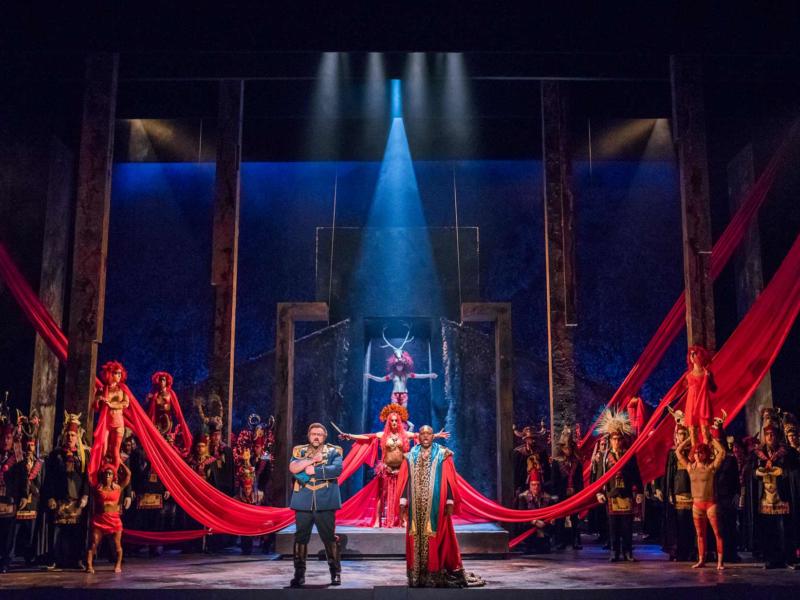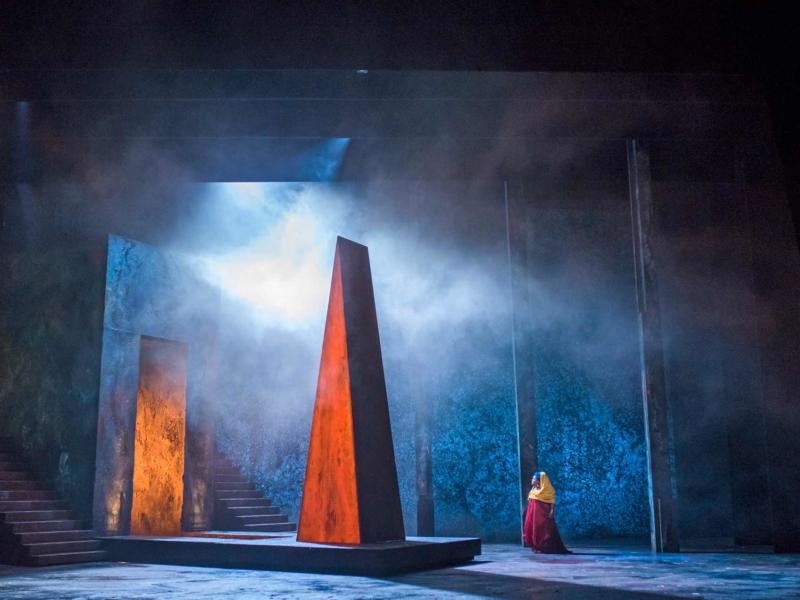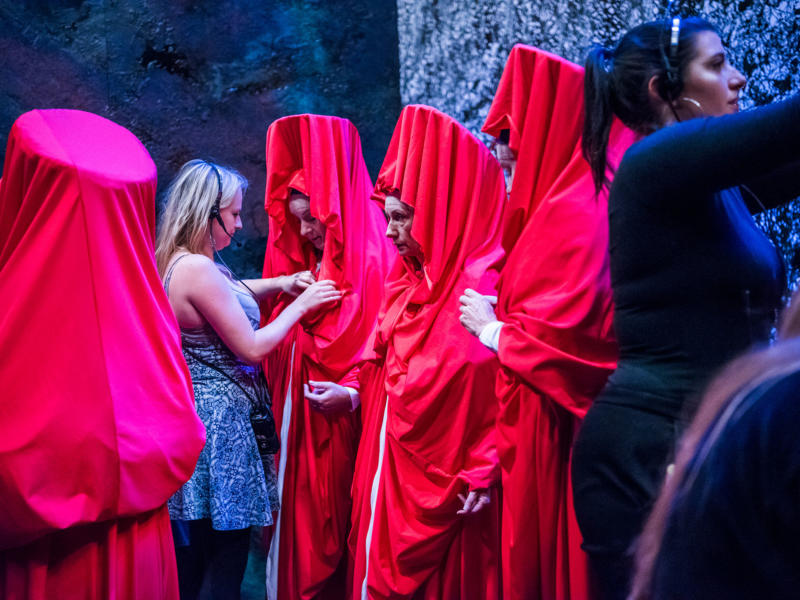Discover Aida
Set in Ancient Egypt, Aida is a timeless story of love and betrayal against the backdrop of war. The story is a roller coaster of emotions told through Verdi‘s powerful music.
Aida is an Ethiopian princess held captive in Egypt, in love with a General, Radames, and he with her. When he is chosen to lead a war with Ethiopia, we follow the conflict of Aida’s love for both Radames and for her country.
Aida Opera Synopsis
Egypt in the time of the Pharaohs
Act I
Scene 1
Ramfis, the chief priest, tells Radames that the god Isis has chosen the general who will lead the Egyptian armies into battle against the invading Ethiopians. Radames hopes that he has been chosen so that he may return victorious to Aida, an enemy slave in the Royal household for whom he cannot openly admit his love. Amneris, Princess of Egypt, secretly loves Radames and questions him about his feelings. She suspects that he prefers Aida to her. The Pharaoh enters with the priests and his court to hear reports of the invasion. He announces that Isis has chosen Radames as Egyptian commander-in-chief and leads everyone in demanding revenge on the Ethiopians. Amneris bids Radames return victorious.
The Egyptians are unaware that Aida is the daughter of the Ethiopian king, Amonasro. Alone, she is torn between her love for her country and for Radames. In despair, she implores the pity of the gods.
Scene 2
Sacred rites are performed in the temple. Ramfis conducts Radames to the altar, where he receives a sword and the gods’ blessing on the campaign.
Act II
Scene 1
Amneris prepares for the celebrations to welcome back Radames. Slaves dance for her amusement until she dismisses them at Aida’s approach. Amneris tells Aida that Radames has been killed in battle. Aida’s grief at this news turns to joy when Amneris admits that she lied about Radames’s death in order to trick the slave girl into admitting her love. Amneris has confirmed her suspicion that Aida is her rival. After threatening Aida, Amneris departs for the festivities.
Scene 2
The Egyptians have won the war and a triumphal procession celebrates Radames’ victory. Amneris crowns him victor, and the Pharaoh offers him any reward he may name. Radames asks for the Ethiopian prisoners to be summoned. Aida recognizes among them her father; he is disguised as a captain and warns her not to reveal his true identity. He pleads for his fellow captives’ lives, but Ramfis and the priests demand their death. Radames, however, requests freedom for the Ethiopians as his reward. The Pharaoh agrees to the compromise suggestion that Aida and her father should be retained as hostages. He then presents Radames with the hand of his daughter, Amneris, and the promise that he will one day rule as Pharaoh. Amneris exults at this unexpected turn of fortune, while Radames and Aida despair.
Act III
On the eve of her marriage, Amneris is taken by Ramfis to pray in the temple of Isis. Radames has chosen a place nearby for a final rendezvous with Aida, who dreams of her homeland while she waits for him. Her thoughts are interrupted by her father, who demands that she discovers the line of attack by which Radames will make the next Egyptian assault.
When Radames arrives Aida suggests to him that he does not love her enough to leave Egypt and live with her in Ethiopia. When at first he refuses, she points out that she and her father are certain to be executed if they remain in Egypt. He therefore agrees to flee with her and she asks him which route they should take to avoid the Egyptian troops. He tells her, whereupon Amonasro steps forward and reveals his true identity. Radames is appalled that he has unwittingly betrayed his country, and now refuses to escape with them. Amneris and Ramfis emerge from the temple. Amonasro moves to attack Amneris but Radames prevents him, and Amonasro and Aida escape. Radames gives himself up to Ramfis.
Act IV
Scene 1
Amneris realizes that she must try to save Radames from the harsh verdict of the priests. She summons him to her presence and begs him to forget Aida and love her instead; this is the price of her intercession on his behalf with the Pharaoh. When he refuses, she dismisses him. The priests file into the judgement chamber and call out the charges against Radames. Amneris becomes increasingly frantic as she realizes that he will not even attempt to defend himself. The priests condemn him to be entombed alive for treason. Amneris curses them as they leave.
Scene 2
Radames has been sealed in a tomb where he is surprised to discover Aida waiting for him. Amneris mourns for Radames as Aida dies in his arms.
Frequently asked questions about Aida
Is Aida an opera?
Aida is one of the most famous and widely performed operas ever written. Known for its dramatic plot, grand music and elaborate staging, it’s easy to see why it inspired Elton John and Tim Rice to create a musical of the same name. The Aida musical premiered on Broadway in the year 2000, and went on to win five Tony Awards during its successful run of 1,852 performances. Aida has also been transformed into several feature-length films – the most well-known being the 1953 film featuring Italian actress, Sophia Loren.
How long is the opera Aida?
An ENO performance of Aida will last approximately 3 hours and 5 minutes, including one interval.
Who wrote Aida?
Aida was written in 1870 by one of the world’s greatest operatic composers, Giuseppe Verdi (1813–1901). Verdi composed the tragic four-part opera to an Italian libretto by Antonio Ghislanzoni. Since premiering in Egypt in 1871, Aida has since been performed over a thousand times, and has become a staple of the operatic repertoire.
What is Aida about?
A political drama centred around power struggles and jealousies; Aida tells the tale of an Ethiopian princess (Aida) who has been kidnapped in Egypt. She falls in love with General Radames who has been chosen to lead a war with Ethiopia, and the opera follows the conflict of Aida’s love for the General and her country. Against the backdrop of war and loyalty, emotions and loyalties are tested – leading to tragic consequences.
Is Aida based on a true story?
No, Aida is not based on a true story. The opera is a dramatic and fictional work of art created by Giuseppe Verdi and Antonio Ghislanzoni. While it draws on historical elements and themes (such as its setting in the real Egyptian Old Kingdom), the storyline and characters are completely fictional and the products of imagination.
Is Aida a good opera?
Aida is a wonderful opera experience, especially for first-time visitors. With majestic choruses and grand marches set against a backdrop of powerful music and spectacular staging, it’s a great performance to start with if you’re new to the art form. Also highly regarded in the world of classical music, Aida is a true testament to traditional operatic works and a genuine treat for the eyes and ears.
Learn about the basics of opera in our helpful beginner’s guide.








